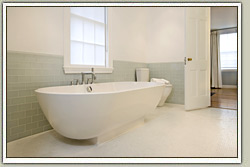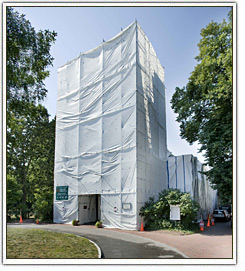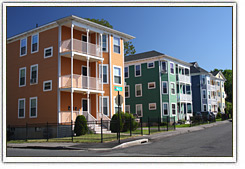| If the content or images below are not being displayed, please click here | ||||||||||||||||||||||||||||||||
 |
||||||||||||||||||||||||||||||||
Charlie Allen Renovations, Inc. |
91 River Street, Cambridge, MA 02139 |
||||||||||||||||||||||||||||||||
PROJECT SPOTLIGHT
In 1893, at a time when female architects were an anomaly, Lois Lilley Howe was not only designing handsome residences, she was also a successful businesswoman and founder of one of America’s first all-female architecture firms. Her peers elected her the first female “fellow” of the American Institute of Architects. During her long career, she accomplished more than 400 commissions, many of them in her signature Colonial Revival style. When the owner of a prominent example of Howe’s portfolio noticed exterior deterioration, he asked us to take a look. We realized that a number of fixes would be required. Most noticeably, the original stucco had developed a number of cracks and several larger sections had broken off completely. The exterior cornice and trim needed painting, and roof balustrades had deteriorated and required repair. Fixes included the following:
It was an honor to restore this lasting example of Lois Lilley Howe’s legacy, and we’re proud to say that the project recently received a historic preservation award from the Cambridge Historical Commission. |
||||||||||||||||||||||||||||||||
EVENTS CALENDAR
19th annual Cambridge Carnival International 2011: Saturday, September 10 from noon to 7:00 p.m. Billed as the largest festival in Cambridge, this all-day event, rooted in African traditions, features a grand costume parade and “rich rhythmic musicality promoting all types of cultures.” In Kendall Square. For more information: http://www.cambridgecarnival.org. Hunt for History—a Tory Row Quest: during open hours at the Cambridge Historical Society The Tory Row Quest is “a self-guided, historical and architectural treasure hunt focusing on Cambridge before and during the American Revolution. Rhyming clues lead to different points of interest along Brattle Street while telling the story of the people who once lived here.” Pick up your clues at the CHS, 159 Brattle Street. For more information, please call 617/547-4252. |
||||||||||||||||||||||||||||||||
|
||||||||||||||||||||||||||||||||
ASK MARK Q: On your company website, what do the various certifications and licenses mean? When I’m looking for someone to do my renovation project, which of these is most important?
Since founding the company in 1978, Charlie has put a premium on a well-trained, well-educated staff, and our Working with Us: Licenses, Certifications, and Insurance webpage offers a rundown of just about every key renovation/build acronym you’ll need. Home Improvement Contractor (HIC) License, Commonwealth of Massachusetts: To put it mildly, if your contractor doesn’t have one, this should be a huge red flag. Contractors working in Massachusetts are required by law to hold this license. And working with an HIC-licensed contractor means that if you have a grievance with your builder and an arbitrator finds in your favor, you can be reimbursed from the HIC guarantee fund – a pool of money that all HIC licensed contractors in Massachusetts contribute to. Construction Supervisor License (CSL), Commonwealth of Massachusetts: The construction supervisor license means that your contractor is legally able to do structural work on your home and to pull all necessary permits. Again, if you’re working with someone who doesn’t hold this license (and asks you to pull permits for them) you might want to quickly reconsider. Obtaining a construction supervisor license requires a 4-6 hour written test and a notarized affidavit that a worker has at least five years experience in the field. NARI (National Association of the Remodeling Industry) and NAHB (National Association of Home Builders) are two of our industry’s leading national trade organizations. Each sponsors certification programs that train members in evolving renovation and build procedures. At CAR, our project managers are NARI Certified Lead Carpenters (CLC), which means that they are trained in standard carpentry techniques plus mechanicals like the electrical, plumbing, and HVAC systems. This program teaches what it really takes to run a job on the construction site, nine hours a day, dealing with your own team and all of your subcontractors. Certified Remodeler (CR) certification is a similar program geared more toward management and the business of running a renovation company from the office and customer relations perspective. Like the lead carpenter program, it involves eight to ten comprehensive study sessions and a long written test. Finally, NARI now offers a Certified Green Remodeler program. As a CGR, I’ve been trained in the latest sustainable building practices. During this program, we focus on all aspects of green building, from energy efficient building envelopes to high efficiency mechanicals, to sourcing materials such as sustainably harvested woods, recycled products, etc. Through the NAHB, members of our team have been named Certified Aging in Place Specialists (CAPS), meaning that we’re well versed in renovation techniques that accommodate the elderly, disabled, or injured. We’re also Lead Certified Remodelers, which means we’ve been trained on methods that ensure homeowner and worker safety when working in homes that contain lead paint (almost any built before 1978.) This is called the Renovation, Repair and Painting (RRP) program and is currently the law under new federal guidelines. In Massachusetts, the Department of Health oversees the program and all information, including who is registered, can be found on their website. In addition, every member of the CAR field staff attends and completes annual OSHA safety training courses in construction safety. Project Managers also attend first aid training with the American Red Cross. So next time you’re looking for a good contractor, search for acronyms beyond “BBB” and you’ll find out exactly what kind of builder you’re dealing with! |
||||||||||||||||||||||||||||||||
IN THE COMMUNITY
|
||||||||||||||||||||||||||||||||
|
||||||||||||||||||||||||||||||||
WHAT IS A PERIOD HOME? We may not think of them as historical treasures, but the triple-decker has been an integral feature of the New England city landscape for more than one hundred years, and in some Cambridge neighborhoods, it remains one of the most predominant styles. This three-story housing style emerged as working class immigrants arrived in the major cities of the Northeast by the thousands. By stacking apartments on narrow plots of land, multiple families could be housed close to work and all the necessities of city living. And in the days before air conditioning, the triple-decker, which allowed for the flow of air and light on all four sides, was seen as a big improvement over the brownstone or row house style, which placed buildings side-by-side.
|
||||||||||||||||||||||||||||||||
|
||||||||||||||||||||||||||||||||
 We recently had the opportunity to restore the exterior of a 1923 Colonial Revival-style house named to the National Register of Historic Places in 1986. The house is one of many here in Cambridge designed by a little-known but impressive architectural trailblazer.
We recently had the opportunity to restore the exterior of a 1923 Colonial Revival-style house named to the National Register of Historic Places in 1986. The house is one of many here in Cambridge designed by a little-known but impressive architectural trailblazer. 
 If you’ve seen the Cambridge Center for Adult Education’s fall catalogue, you know that Charlie will be leading a tour of the historic Hooper-Lee-Nichols House, at 159 Brattle Street, on Saturday, October 22, from 2 – 3:30 p.m. Now the home of the Cambridge Historical Society, the circa-1685 house was a private residence for nearly 300 years. Charlie will share some of the history of the house and its residents, as well as the mystery (experts still aren’t sure which side of the house is the original dwelling and which was added in 1716.) As a CHS vice president and its longtime facilities director, Charlie promises to share all he knows. Visit
If you’ve seen the Cambridge Center for Adult Education’s fall catalogue, you know that Charlie will be leading a tour of the historic Hooper-Lee-Nichols House, at 159 Brattle Street, on Saturday, October 22, from 2 – 3:30 p.m. Now the home of the Cambridge Historical Society, the circa-1685 house was a private residence for nearly 300 years. Charlie will share some of the history of the house and its residents, as well as the mystery (experts still aren’t sure which side of the house is the original dwelling and which was added in 1716.) As a CHS vice president and its longtime facilities director, Charlie promises to share all he knows. Visit  A: There are many contractors out there, and licenses and certifications are not only one of the best ways to find out whether you’re dealing with someone who’s well-trained and committed to their trade, but also whether they are even allowed to be doing business.
A: There are many contractors out there, and licenses and certifications are not only one of the best ways to find out whether you’re dealing with someone who’s well-trained and committed to their trade, but also whether they are even allowed to be doing business.  This summer we’re working on a very exciting project: the exterior restoration of Christ Church Cambridge, on Garden Street in Harvard Square. Our work on this historic building, which has seen everyone from George and Martha Washington to Theodore Roosevelt and Martin Luther King, Jr., cross its threshold, will wrap up in time for the church’s 250th anniversary celebration in October. If you’re passing through the Square, please stop by and take a look at the transformation!
This summer we’re working on a very exciting project: the exterior restoration of Christ Church Cambridge, on Garden Street in Harvard Square. Our work on this historic building, which has seen everyone from George and Martha Washington to Theodore Roosevelt and Martin Luther King, Jr., cross its threshold, will wrap up in time for the church’s 250th anniversary celebration in October. If you’re passing through the Square, please stop by and take a look at the transformation! Triple-deckers were built to serve a purpose, and therefore usually featured a basic, utilitarian design, with flat roofs and little ornamentation. In crowded city environments, porches at the front and back gave residents some private outdoor space. In most triple-deckers, a central door opened to a staircase leading to the second and third floors, while first floor tenants sometimes had their own separate entrance. The triple-decker style enjoyed its heyday from approximately 1870 until the 1920s. In Cambridge, Somerville, and Boston neighborhoods like Jamaica Plain and Dorchester, many surviving triple-deckers have been rehabbed as condominiums, providing a measure of privacy, plus natural light and cross-breezes, to a whole new generation of city dwellers.
Triple-deckers were built to serve a purpose, and therefore usually featured a basic, utilitarian design, with flat roofs and little ornamentation. In crowded city environments, porches at the front and back gave residents some private outdoor space. In most triple-deckers, a central door opened to a staircase leading to the second and third floors, while first floor tenants sometimes had their own separate entrance. The triple-decker style enjoyed its heyday from approximately 1870 until the 1920s. In Cambridge, Somerville, and Boston neighborhoods like Jamaica Plain and Dorchester, many surviving triple-deckers have been rehabbed as condominiums, providing a measure of privacy, plus natural light and cross-breezes, to a whole new generation of city dwellers.